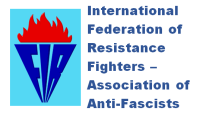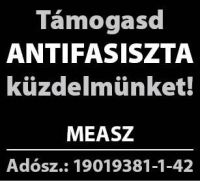Hanti Vilmos a Magyar Ellenállók és Antifasiszták Szövetsége (MEASZ) elnöke hazajött egy hónapos Szent Jakab-zarándokútjáról, amelyet Magyarországon többnyire El Caminonak hívunk. A negyedik útjának különleges célja is volt, hiszen Hanti Vilmos ezt a mottót adta neki: „Zarándoklás Magyarországért: szabadság, egyenlőség, testvériség!” A több mint 600 km-t gyalog megtett zarándokkal beszélgettünk.

Miért mennek az emberek zarándokútra?
A katolikus egyháznak három jelentősebb zarándokútja volt a kezdetektől: Jeruzsálembe, Rómába, és a spanyolországi Santiago de Compostellába. A zarándokok gyalogosan tették meg a hatalmas utat, közben nélkülöztek, az út gyötrelmeitől szenvedtek, reménykedtek, hogy annyi testi kín után Istenhez intézett kéréseik meghallgatásra találnak. Rendkívül érdekes, hogy a Santiágoba tartó legismertebb út szinte nyílegyenesen megy keletről nyugatra. A zarándoklás alatt tapasztalni lehetett, hogyan épültek először templomok az út mentén, hogyan alakultak ki a települések körülöttük.
Ön miért választotta az említett mottóját az útra?
A korábbi zarándoklataimat is a családomért, ismerőseimért ajánlottam föl. Az idei utam célját a belpolitikai helyzet tette indokolttá. Úgy látom, hogy nagyon sok tisztességes keresztény testvérem támogatta az Orbán kormányt, mert az keresztény frázisokkal megtévesztette őket, miközben egy szűk, családi-barátok közti meggazdagodást képvisel. Nem, hogy nem törődik a szegényekkel, hanem számukra hátrányos intézkedéseket hoz, gyűlölködést szít sok esetben, tudatosan mélyíti a szakadékot magyar és magyar ember között, s a legfontosabb kincsünket, a demokráciát is fölszámolja. Az Orbán-kormány kereszténykedő máza mögött a valóságban egy hatalommegtartó érdek van csupán, semmi több, amely ráadásul a pogány kultúrát is keveri a kereszténységgel.
Ha Magyarországon az uborkahívők egyházának lenne akkora bázisa, mint a kereszténységnek, akkor Orbán bizonyára uborkahívő lenne. Éppen ezért a látszathitet egy tisztes keresztény embernek nem szabad támogatnia. Azért mentem el a negyedik utamra, hogy a keresztény vallás eszközeivel tiltakozzam mindezek ellen. Sokat fohászkodtam, imádkoztam, hogy mindezek megváltozzanak. A katolikus hagyomány szerint kértem a szentek közbenjárását, hogy szeretett hazám, Magyarország érdekében mindez így ne menjen tovább. Hovatovább azok, akik jobban tudnak mozdulni, elmennek itthonról, maradnak a kevésbé tehetősek, azok, akik kevésbé igazodnak el a világ dolgaiban, akiket az Orbán-hatalom még inkább a porba tud alázni.
Az út során a zarándoktársak hogy fogadták ezt a fajta mondanivalót?
Magam is meglepődtem azon, hogy mennyire egyetértettek velem. A világ sok országából találkoztam társakkal, és feltűnően sok magyar is volt az úton. Többen meg is ismertek, egy hölgy mondta is „az Olgánál látni szokott engem”. Viccesen válaszoltam is neki, hogy az már régen lehetett, akkor, amikor az Orbán-kormányt rasszista-fasiszta tüneteiért még nem bíráltam. Különösen a franciáknak tetszett, hogy a forradalmukat tekintem követendő példának. Santiagoban egy mellékoltárnál francia nyelvű mise volt. Véletlenül odatévedtem, nem vettem ezt előre észre. A pap zarándoklásom hatására könyörgött Magyarországért a mise keretében, s engem fölkért, hogy magyar nyelven mondjam el a „Miatyánkot”. Igazán szép példáját adta annak, hogy egy adott helyzetben a felfedezett kisebbséget hogy vonja be a szertartásba. Nyilván nagy gyakorlata is volt ehhez, hiszen korábban már megjárta Afrikát, ahol segítette a szegényeket. Egyébként az is érdekes volt egy zarándokszálláson, ahol megtudták, mivel foglalkozom, az alkalmi zenészek a Cao Bella partizándalt kezdték játszani, sokan énekeltek és táncra perdültek.
Elégedett az útjával?
Saját magam megtettem, amit lehetett az úton, itthon igaz keresztény testvéreimre is vár a további feladat. Bizakodó vagyok, hisz Ferenc pápa is történelmi változásokat szeretne a katolikus egyházban végrehajtani. Ő érte is imádkoztam, legyen ereje és lehetősége mindezeket megvalósítani.
-pál-

Pilgrimage for Hungary
Vilmos Hanti, President of the Alliance of the Hungarian Resistance Fighters and Antifascists (MEASZ) returned from his one month long Saint James’ Way pilgrimage made on the road of El Camino in Spain. This was his fourth journey, which, as his motto stated had a special aim: “Pilgrimage for Hungary: freedom, equality, fraternity!”
After his more than 600 kilometres long pilgrimage, we made an interview with him.
Why do people go on pilgrimage?
The Catholic Church has had three main pilgrimage destinations from the beginning, Jerusalem, Rome, and Santiago de Compostela in Spain. The people passed the long way by foot and during their journey suffered a lot but hoped that after their physical pains and destitution their requests towards God would be fulfilled. It is very interesting that the best known and famous route to Santiago leads almost straight from east to west. During the journey one can observe how the churches were built along the way and how the settlements evolved around them.
Why did you choose the above mentioned motto for your journey?
My previous pilgrimages were offered for my family and relatives. The inner political situation justified the purpose of my present journey. I think that many honourable fellow-Christians supported the Orbán government because they were misled by Christian phrases while it represents the enrichment of a small circle of family and friends. The government does not care for the poor and even takes adverse actions, spreads hate, consciously deepens the gap between the Hungarian people, and gradually eliminates our main treasure, democracy. Behind the Christian glaze of the Orbán regime, the reality is of only a pure power preserving interest which also mixes the pagan culture with Christianity.
If the basis of cucumber believers would be as big as the Christian’s in Hungary, then Orbán would be surely a cucumber believer. A true Christian should not support the pseudo faith. This is why I made my fourth journey, to protest against all of these with the means of Christian religion. I have prayed a lot for change. In accordance with the Catholic tradition I have requested the assistance of the saints to help end of all these things in the interest of my beloved motherland, Hungary. Furthermore, all those who had the opportunity have already moved from their homeland, and thus the less wealthy remain, those who do not know their way around in the world affairs, who can be humiliated even more by the Orbán regime.
How did the other pilgrims accept this message during the journey?
I was also surprised how much the others agreed with me. I have met many people from all over the world and, remarkably a lot of Hungarians were on the road also. Several of them even recognized me. The French especially liked the fact that I considered their revolution as an example to be followed. In Santiago I accidentally walked in a side-altar where a mass was being held in French; on the influence of my pilgrimage the priest prayed for Hungary and asked me to recite Our Father in Hungarian. It was a nice example of how one, in a certain situation, can involve a detected minority into the service. Obviously he had great experience in such situations as he has served earlier in Africa where he helped the poor. It was also an interesting experience, when in a pilgrim hostel they found out where I work and what I do and so the occasional musicians started to play the Bella Ciao partisan song to which a lot of people started to sing along and dance.
Are you satisfied with your journey?
Personally, I have brought out as much as possible from this journey; but here at home there is still much to be done by my fellow-Christians. I am optimistic because Pope Francis also wants to achieve historic changes in the Catholic Church. I have also prayed for him, so that God give him strength and opportunity for him to fulfil all this.

2013. július 30.






